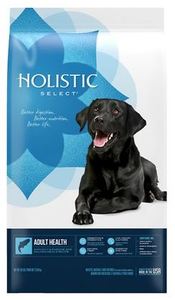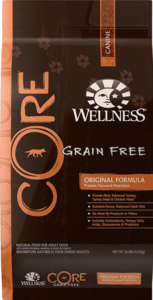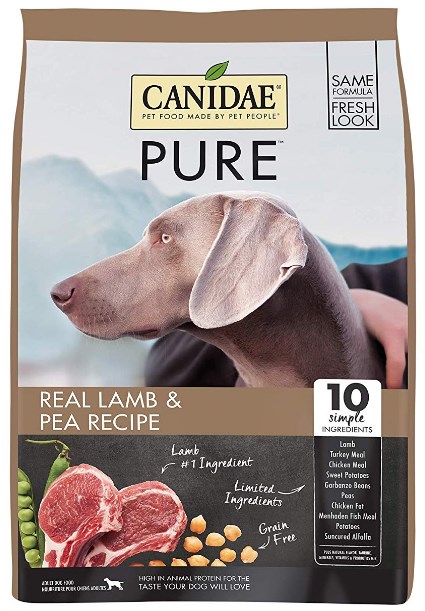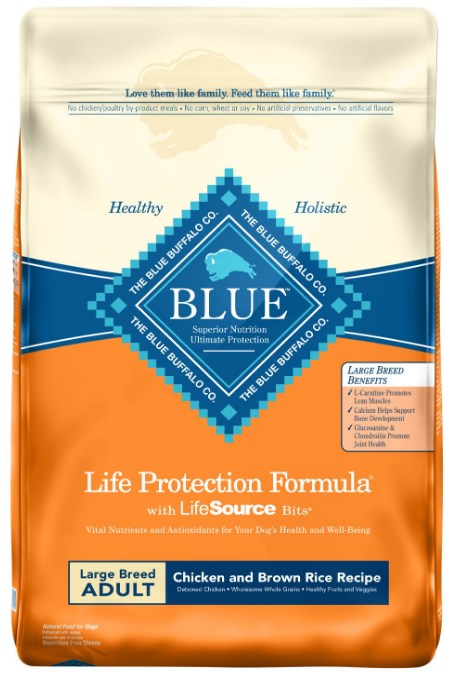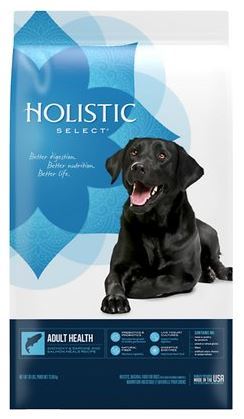Healthy Hound Chow: The Best Dog Food for Coonhounds
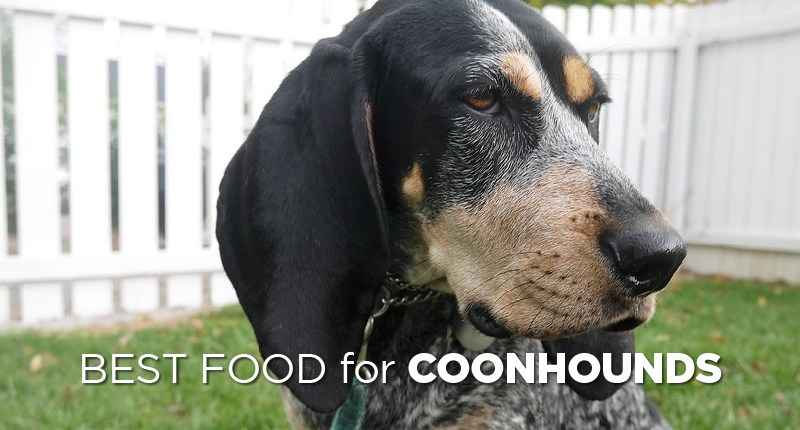
With their droopy ears, big, baleful eyes and jowly visage, coonhounds are fantastic hunting dogs and even better pets. Chances are, if you own a coonhound, you’ve enjoyed both their peppy playfulness and their gentle, lapdog-like cuddliness; as their master, you want to make sure they’re in top health. Luckily, we’re here to help you find the best dog food for your coonhound to ensure they’ve got the best nutrition available!
Quick Look: 4 Great Dog Food Choices for Coonhounds
**There's more info below, but you can also click the links above to see current prices or read customer reviews on Chewy.
How to Feed a Coonhound
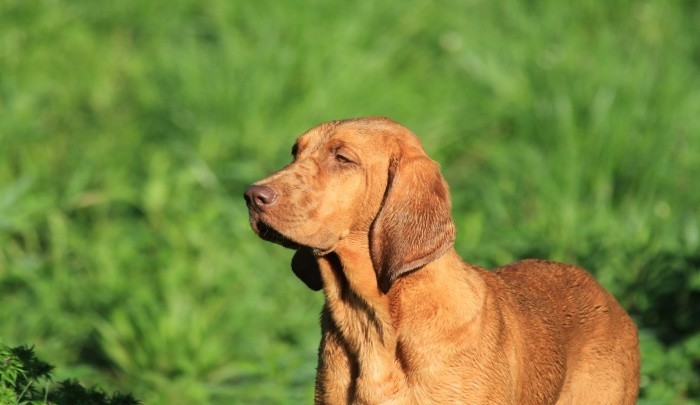
When feeding your coonhound, it’s best to feed them somewhere between 3 to 5 cups of a high quality dog food each day, split into two meals – one in the morning and one in the evening. This is a little bit more than you might give other breeds of dog, but boy do coonhounds love to eat!
More than most other kind of dog, coonhounds will beg and beg and beg for food, so you might be able to give them one or two small snacks a day if you really want to treat them. Don’t overdo it, though!
Because of that, though, you want to be extra careful to make sure you keep a close eye on the food intake of your Black and Tan Coonhound, so that you can keep them from getting too fat. Keep your food strictly measured and their intake maintained to get them the right nutrition without fattening them up.
When it comes to actually feeding them, you might have to look between feeding them a commercial dog food or making your meals yourselves. There are pros and cons to each – you’ll be more in control of your dog’s diet with self-made meals, but you might not be able to give them the full nutrition and dental health that commercial feeds can provide.
Commercial foods are way more convenient and economical, even if you spring for the really good, high-end stuff (which it’s recommended you do). To that end, there are plenty of good reasons to invest in a high-quality, AAA dog food for your coon hound in order to ensure their best health.
OUR RECOMMENDATION:
Holistic Blend Grain Free
If you want to make sure your coonhound has the right nutrition, this involves finding the best dog food for their specific needs. Looking over the various options out there, we thought that Holistic Blend Grain Free seemed to work out well for coonhounds in particular.
Since coonhounds are relatively lean dogs, it stands to reason that having such a low-carb feed might help them – Holistic Blend only has 25% carbs, which is much lower than a lot of other high-quality dog foods.
The difference is made up with a largely equal ratio of proteins to fats, both of which your coonhound needs to stay healthy and happy.
Most of this feed is comprised of turkey meal and turkey, which is nice for that lean protein content; essential oils and more fish proteins can be found in the salmon meal within Holistic Blend, which is a high-quality ingredient you don’t often see. In terms of vegetable content, the rest of the feed contains healthy complex carbs and vitamins contained in potatoes, peas, sweet potato, kelp, pumpkin, spinach and more – it’s a veritable beef salad for your coonhound, which we appreciate.
Pros & Cons
- Instrumental in healthy muscle development and providing high energy
- Contains key fatty acids and lean proteins
- Good for joint and dental health
- Not a whole lot
There are quite a few fantastic dog foods for coonhounds out there – this is just the one we thought would work for the unique requirements of such a big ol’ regal dog like the coonhound. That being said, always consult your veterinarian, and make up your own mind with your own research and intuition, before deciding on a diet plan for your coonhound. If you pick the right food, you’ll be sure to give your best friend the life (and health) it deserves!
Learn More About Coonhounds!
How Many Calories Does a Coonhound Need?
**Please note: these estimates are based on an average weight for this breed. Every dog is different. Please talk to your vet before making changes to your dog's diet.
Most coonhounds will end up weighing anywhere from 55 to 80 pounds, making time some pretty decently-sized mid-range breeds. To that end, if, for example, you’ve got a 65-pound coonhound who’s typically active in the way most coonhounds are, you’ll want to feed them about 1394 kcal/day.
If your coonhound is getting on in years, and is naturally less active than they used to be, you might want to reduce their food intake to 1141 kcal/day. However, those dogs that are more active than even your normal coonhound will want to increase their diet to 2218 kcal/day, to keep up with all the energy they’re burning.
Macronutrient Information
In order for your coonhound to grow up big and strong, they’re going to need high quality animal protein, which will give them strong bones and muscles. Dogs are naturally dependent on animal protein as the primary source of nutrition, which makes it crucial that lean meat be the primary ingredient in their food.
When finding the best dog food for your coonhound, scan the ingredients list for the top five ingredients. If there are more grains there than meats, it probably has more plant than animal protein, which you don’t want.
Coonhounds should have enough healthy fats in their diet to keep their short, silky coats healthy and shiny. While we tend to balk at the idea of fat being a good thing, keep in mind that fish oils and healthy fats promote heart health and can aid in liver and digestive health. Just keep your coonhound out of the bacon, and you should be fine; make sure your coonhound’s kibble has more than a little fish meat and essential oils to give them a nice balance in nutrition.
Coonhounds should have enough healthy fats in their diet to keep their short, silky coats healthy and shiny.
Despite what you may think, carbs are also important for coonhounds and other kinds of dogs – complex carbohydrates, that is. Your coonhound needs them much more than anticipated, as they need them for the essential energy they’ll need to do their endless, fitful playing and running.
While lean meat is important, complex carbs are vital to helping your dog maintain a healthy weight. Either way, carbs are important for digestion and caloric fuel, so make sure they have a nice balance in any dog food for coonhounds you might consider getting.
No matter what breed of dog you have, be it coonhound or something else, the most crucial aspect of finding the right dog food for them is to find a high-quality feed that is high-protein, no-grain and has a decent ration of carbs, fats and proteins.
Common Health Problems
- Hip dysplasia. Moreso than other dogs, coonhounds in particular suffer from osteopathic diseases like this.
- Bacterial skin infections. Because of their heavy skin folds, coonhounds can accumulate bacteria in those folds and develop infections. Keep their coat clean with the right amount of healthy fats.
- Bloat. Coonhounds and other deep-chested breeds are particularly vulnerable to this condition.
- Heart disease. Be sure to get a feed that has plenty of omega-3 fatty acids to promote heart health.
- Urinary infections. Keep plenty of water close by and within easy access of your coonhound.
- Eye diseases. Coonhounds are prone toward inherited malformation of the eyes. Consult your vet about diet advice to help treat these issues.
**Disclaimer: Our dog food reviews are based mostly on (1) our expertise and that of the experts with whom we consult and (2) the information provided by the manufacturers. We do test many dog foods (with our dog's help), but we can't test them all. As such, please remember the above recommendations are our opinions, and you should consult your vet before making changes to your dog's diet.


